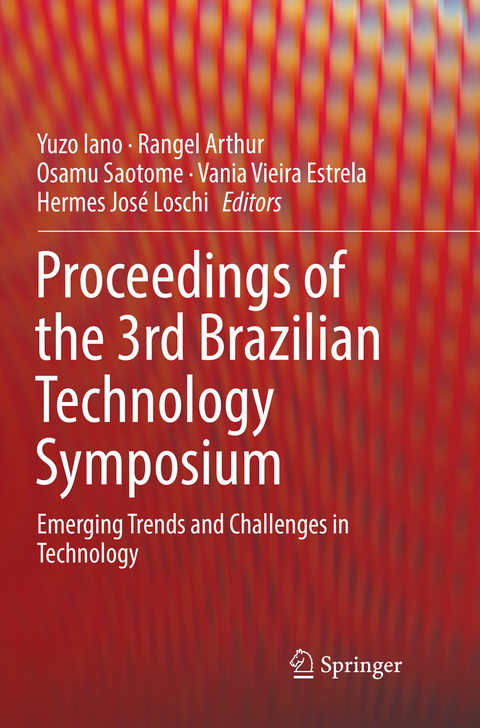
Proceedings of the 3rd Brazilian Technology Symposium
Springer International Publishing (Verlag)
978-3-030-06592-8 (ISBN)
- Prof. Yuzo Iano: BS (1972), Master's degree (1974) and a Ph.D. degree (1986) in Electrical Engineering from the State University of Campinas, Brazil. Since then he has been working in the technological production field, with 1 patent granted, 8 patent applications filed and 36 projects completed with research and development agencies. Successfully supervised 29 doctoral theses, 49 master's dissertations, 74 undergraduate and 48 scientific initiation works. He has participated in 100 master's examination boards, 50 doctoral degrees, author of 2 books and more than 250 published articles. He is currently Professor at the State University of Campinas, Brazil, Editor-in-Chief of the SET International Journal of Broadcast Engineering and General Chair of the Brazilian Symposium on Technology (BTSym). He has experience in Electrical Engineering, with knowledge in Telecommunications, Electronics and Information Technology, mainly in the field of audio-visual communications and data. - Prof. Rangel Arthur holds a BS in Electrical Engineering from the Paulista State University Júlio de Mesquita Filho, Brazil (1999), a Master's degree in Electrical Engineering (2002) and a Ph.D. in Electrical Engineering (2007) from the State University of Campinas (Unicamp), Brazil. From 2011 to 2014, he was Coordinator and Associate Coordinator of the Telecommunications Technology and Telecommunications Engineering Courses at Faculdade de Tecnologia (FT), which was created under his management. From 2015 to 2016, he was Associate Director of UNICAMP's FT. He is currently an advisor to the Innovation Agency (Inova) of Unicamp. He has experience in the area of Electrical Engineering, with emphasis on Telecommunication Systems, working mainly on the following topics: telecommunications, digital signal processing, and control. - Prof. Osamu Saotome has a B.Sc. in Electronic Engineering from the Instituto Tecnológico de Aeronáutica - ITA, Brazil, M.Sc. and Ph. D. in Electrical and Electronic Engineering (EEE), Digital Signal Processing (DSP) from the Tokyo Institute of Technology, Japan. His interests include Electronic Circuits, Microprocessors, Digital Signal Processors (DSPs), Embedded Electronic Systems/Software, FPGAs, Intelligent Sensors, Real-Time Systems/Algorithms, Digital Image Processing and Video systems projects with FPGA, Radar Receivers, Global Geo-Positioning Systems (GPS), Global Navigation Satellite System (GNSS), Mechatronics, Aerial Robotics/Navigation, Inertial Systems, Ultra-High Reliability Systems, Avionics, and Computers for Artificial Satellites. Member of the IEEE. He has been (co-)author of hundreds of scientific publications, and international research/cooperation projects with the Brazilian Air Force, INPE, IEAv, France, Sweden, USA, and Japan, among others. - Prof. Vania Vieira Estrela: B.Sc. degree from Federal University of Rio de Janeiro, Brazil, in Electrical and Computer Engineering (ECE); M.Sc. from the Instituto Tecnológico de Aeronáutica (ITA); M.Sc. degree in ECE at Northwestern University, USA, and Ph.D. in ECE from the Illinois Institute of Technology, USA. Taught at: DeVry University; DePaul University; Universidade Estadual do Norte Fluminense, Brazil, and Universidade Estadual da Zona Oeste, Brazil. Visiting professor at the Polytechnic Institute of Rio de Janeiro, Brazil. Currently Professor at Universidade Federal Fluminense, Brazil. Research interests include signal/image/video processing, inverse problems, computational & mathematical modelling, stochastic models, multimedia, electronic instrumentation, machine learning and remote sensing. -Prof. Hermes José Loschi graduated in Control and Automation Engineering , M.Sc in Electrical Engineering. Currently a Ph.D. Candidate by Department of Communications (DECOM), Faculty of Electrical and Computer Engineering (FEEC) at State University of Cam
lt;p>1. INTERDISCIPLINARY FORUM
1.1. How to build bridges between different ways of working
1.2. Nurturing the dialog between different specializations
1.3. How to deploy a project: from the designer desk to human beings
1.4. New paradigms dedicated to organize evolving technology efforts for the benefit of humanity
2. SMART DESIGNS
2.1. Architecture and Urbanism
2.2. Computer Science
2.3. Informatics
2.4. Industrial Design
2.5. Probability and Statistics
2.6. Aerospace Engineering
2.7. Agricultural Engineering
2.8. Biomedical Engineering
2.9. Civil Engineering
2.10. Electrical Engineering
2.11. Production Engineering
2.12. Mechanical Engineering
2.13. Other STEM areas
2.14. Industry 4.0
2.15. Big Data
2.16. Resilient and robust control
2.17. Flexibility and self-healing abilities2.18. Vehicle systems
2.19. Smart system architectures
2.20. Smart electricity2.21. Decentralized decision-making
2.22. Phishing analytic and system security
2.23. Microgrid and islanding application and operation2.24. Quality-of-Service (QoS), energy-efficiency, and fault tolerance
2,25. Resource management
2.26. Smart infrastructural dependencies2.27. Distributed control and efficient optimization methods
2.28. Modelling and simulation of smart systems
2.29. Data analytics, sensing, processing and communication techniques for smart cities2.30. Management techniques for distributed energy generation and storage to increase power
availability in smart cities
2.31. Energy storage technologies2.32. Service engineering and algorithm design
2.34. Real-world deployment experiences
2.35. Standards and interoperability of smart designs2.36. Scalable designs
2.37. Potential methods for sensor and actuator networking
2.38. Cyber-physical systems
3. MEDICAL ELECTRONIC INSTRUMENTATION
3.1. Informatics for Healthcare, Humanitarian Engineering, Public Health, and Transdisciplinary Efforts
3.2. Electronic Instrumentation
3.3. ICT Design practices, Integration
3.4. Engineering for Healthcare, Humanitarian Engineering, Public Health, and Transdisciplinary Efforts
3.5. Inpatient and Outpatient Care
3.6. Assistive Living
3.7. Ethics
3.8. Decision Making in Human Centric Applications
3.9. Simulation and Modeling in Human Centric Applications
3.10. Services in Human Centric Applications
3.11. Neuroinformatics
3.12. Translational Bioinformatics and Drug Design
| Erscheint lt. Verlag | 13.12.2018 |
|---|---|
| Zusatzinfo | XVIII, 328 p. 172 illus., 133 illus. in color. |
| Verlagsort | Cham |
| Sprache | englisch |
| Maße | 155 x 235 mm |
| Gewicht | 534 g |
| Themenwelt | Technik ► Elektrotechnik / Energietechnik |
| Technik ► Nachrichtentechnik | |
| Schlagworte | Cross-Sectional Analysis • electronic instrumentation • humanitarian engineering • internet of things • sensor networks • smart cities • Smart Grid • solidary design • sustainable development • sustainable electronics • Technology Transfer • transversal studies |
| ISBN-10 | 3-030-06592-8 / 3030065928 |
| ISBN-13 | 978-3-030-06592-8 / 9783030065928 |
| Zustand | Neuware |
| Haben Sie eine Frage zum Produkt? |
aus dem Bereich


